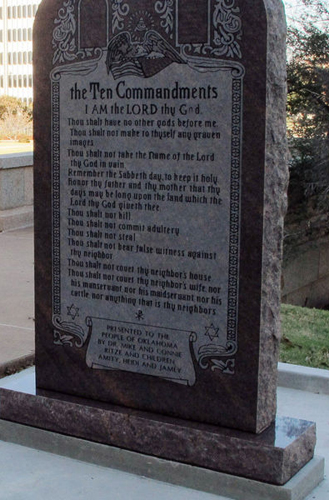 The Ten Commandments monument is pictured at the state Capitol in Oklahoma City,
The Ten Commandments monument is pictured at the state Capitol in Oklahoma City,
Oklahoma's highest court said the Ten Commandments are "obviously religious in nature and are an integral part of the Jewish and Christian faiths."
Integral they may be, but to characterize their importance as chiefly religious requires willful neglect of our nation's history. The Decalogue is certainly sourced in biblical texts. But the effect that they — and religious life in general — had on the development of this country can and must be appreciated in terms that have nothing to do with religious practice.
This is important because the United States Supreme Court has previously ruled in favor of "religious" expressions and displays when they also have a clear secular purpose.
Christmas crèches on public grounds are not seen as a violation of the Establishment Clause because Christmas has, for many, evolved into an annual winter holiday with meaning not limited to one's appreciation of the birth of Jesus.
Suits on behalf of atheists to have "In G0D We Trust" removed from our currency failed in the courts.
"It is quite obvious that the national motto and the slogan on coinage and currency 'In God We Trust' has nothing whatsoever to do with the establishment of religion. Its use is of patriotic or ceremonial character and bears no true resemblance to a governmental sponsorship of a religious exercise," ruled the United States Court of Appeals for the Ninth Circuit in Aronow v. United States in 1970.
If it is kosher to acknowledge that trust in G0D was an undeniable part of the story of this nation, it is all the more proper to recognize the gifts that the two tablets of Law have provided for our society.
Those who founded Plymouth Rock and other colonies in search of religious freedom also planted ideas that were bound up with their religious outlook, but live on in a completely secular context. Those included rugged individualism, industry, charity, justice, loyalty, the appreciation of Man as created in G0D's image, and the centrality of family.
These ideas, not all of them available in other parts of the globe, helped paved the way for America's unique development and success.
These ideas and values flowed directly or otherwise from the tablets that recorded a covenant between a G0D who sought partners committed to justice and compassion, not slaves to serve Him.
Read the text of the Ten Commandments alone, and perhaps all you see is religious instruction. But that is not the best way to read history, which requires reading between the lines, and scouring the space in the margins for fuller meaning.
Witness King John of England, whose agreement with 40 barons 800 years ago known as the Magna Carta was celebrated on a grand scale at Runnymede on June 15. The king almost immediately reneged on its stipulations, and the documents had little practical effect at the time.
Yet, it is remembered as one of the most important moments for the development of Western democracy, cited again and again as a pillar of modern political and legal thought.
"It's a mistake to think that a document's importance can be measured solely by the immediate context in which it's produced," said Noah Feldman, a professor at Harvard Law School. The significance of the Magna Carta "doesn't rest on what King John and those particular barons were doing at that particular time, but on the length of the legacy in using and interpreting and holding up this document as a banner for the rule of law."
The same is true of the Ten Commandments. Their significance cannot be described or limited by how people who attend churches and synagogues (and mosques, according to a number of Muslim writers) respond to Moses' ten cardinal rules, but in the impact they had on millions of our forebears, great and small.
Where the Oklahoma judges saw only parochial religious interest and an attempt at coercion of non-believers, they should have taken a closer look at the myriad faith-neutral blessings Moses' tablets conveyed to the world.
The Ten Commandments undeniably gave future generations a legacy that changed the course of human civilization, with its greatest impact on a young country founded for the very purpose of granting individual liberties within a context of tolerance.
Religious and atheist Americans alike should hope that the Oklahoma monument will stay and bear mute testimony to a part of our past that is immutable and unforgettable.
We hope its lessons will continue to be etched in stone and in our hearts.
Comment by clicking here.
Rabbi Abraham Cooper is associate Dean of the Simon Wiesenthal Center in Los Angeles. Rabbi Yitzchok Adlerstein is its Director of Interfaith Affairs.



 Contact The Editor
Contact The Editor
 Articles By This Author
Articles By This Author